Your cart is currently empty!
Category: Technology
-
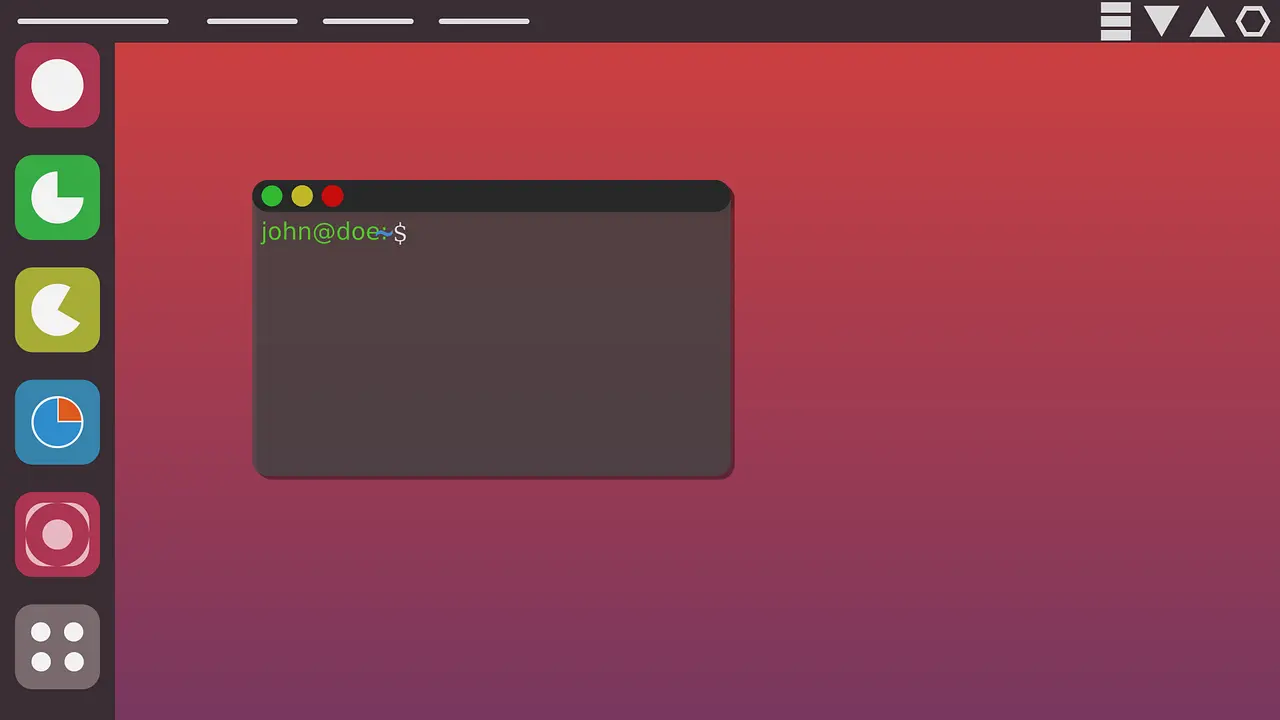
Installing VirtualBox Guest Additions on Ubuntu 24.04 LTS Desktop
Subscribe to 22halomedia YouTube Channel
Introduction
Yesterday’s article, “Spinning up an Ubuntu 24.04 LTS Desktop VM in VirtualBox,” provided the necessary knowledge to install Ubuntu 24.04 LTS Desktop on a VirtualBox VM (Virtual machine).
Today, we will cover how to install VirtualBox Guest Additions, a package of utilities and drivers that enhances the performance and ease-of-use of VirtualBox VM’s.
Install VirtualBox Guest Additions
In the top left corner of your Ubuntu desktop, click the Activities overview. You can also press the Super key on your keyboard.
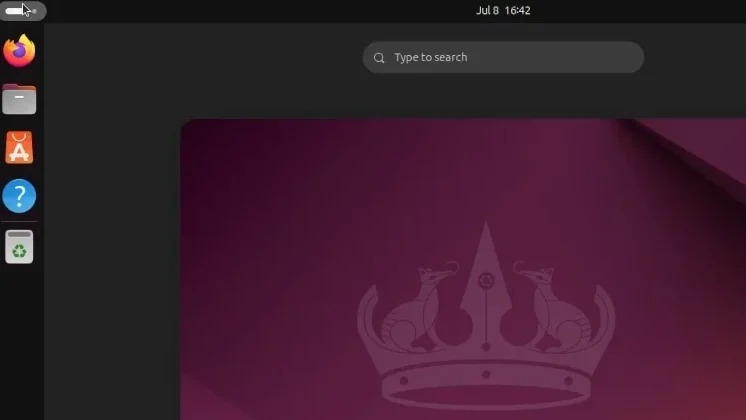
Click the search bar that labeled “Type to search“, and begin typing “terminal”. The Terminal application will appear before you finish typing. Click on Terminal to launch it.
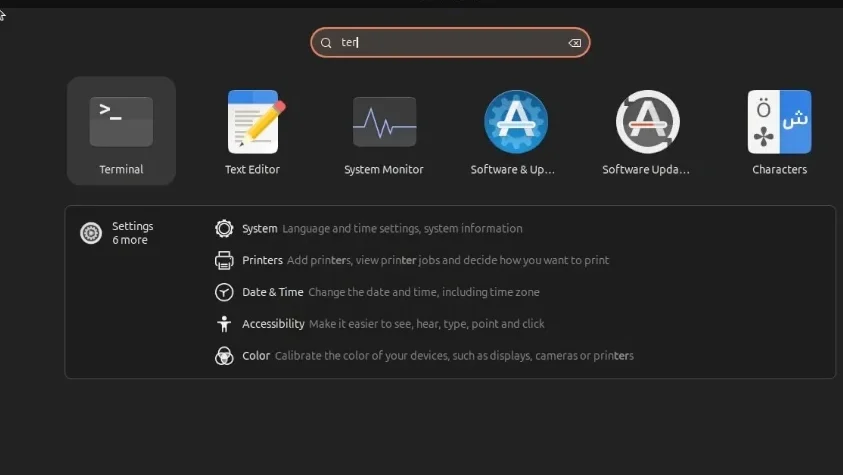
Update your Ubuntu system with the following command:
sudo apt update -yYou will get a warning message outputted to the console that reads “Warning: The unit file, source configuration file or drop-ins of apt-news.service changed on disk. Run ‘
systemctl daemon -reload‘ to reload units.”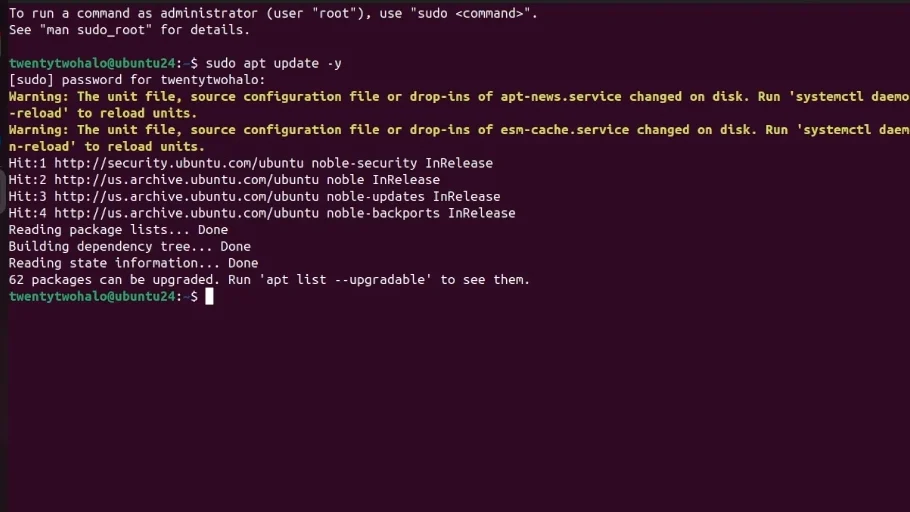
Run the command from the error message above to reload Systemd files:
systemctl daemon-reloadEnter your sudo user’s password and click Authenticate.
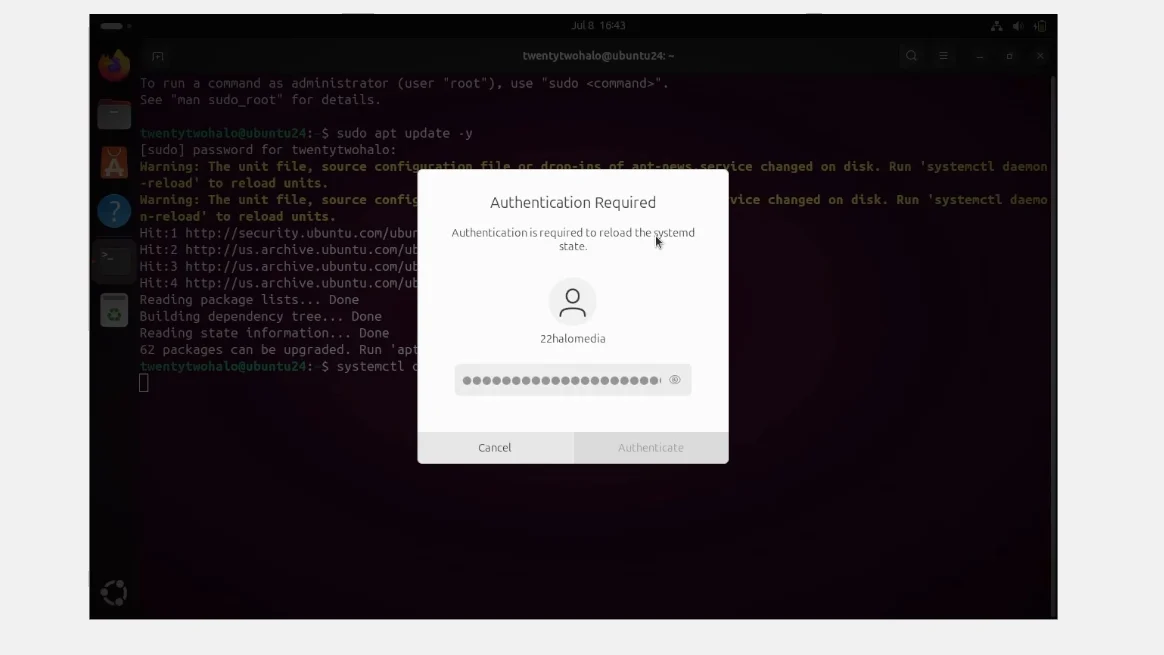
Upgrade your Ubuntu system with the following command:
sudo apt upgrade -yClick Devices > Insert Guest Additions CD Image… in the VirtualBox toolbar.
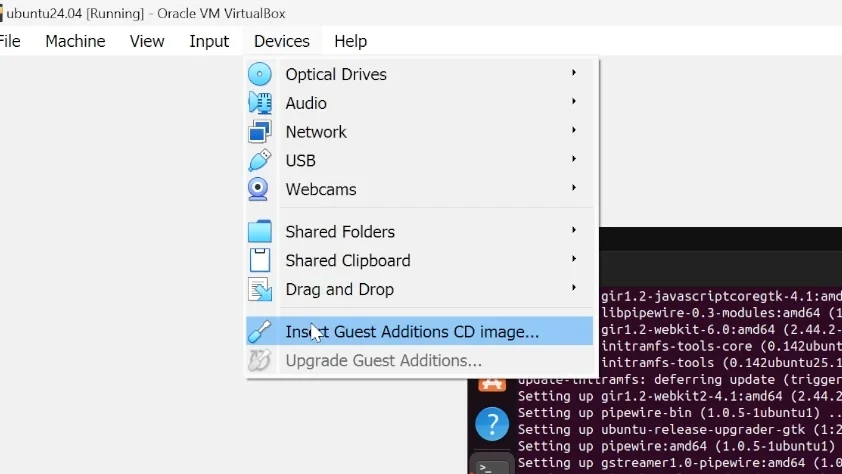
Select Files from the Ubuntu dock.
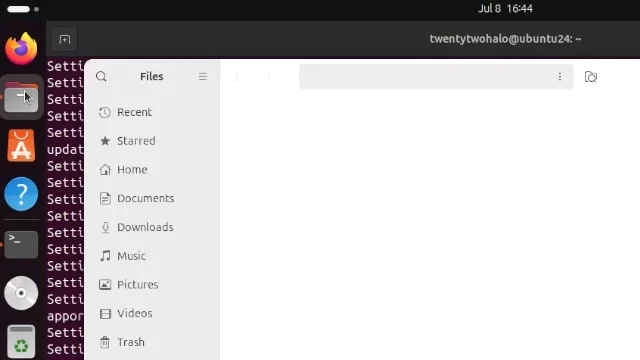
In the left-hand menu of Files, click, VBox_GAs…
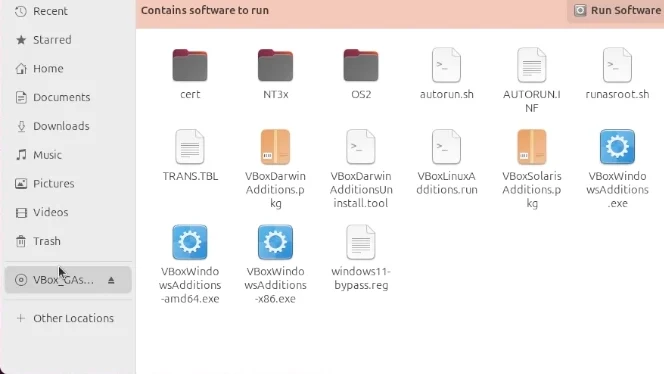
Click Run Software in the orange banner that reads “Contains software to run” near the top of Files.
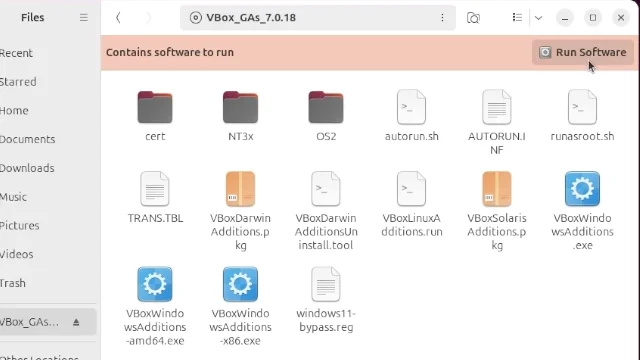
Click Run when the next window titled ‘”VBox_GAs_7.0.18″ contains software intended to be automatically started. Would you like to run it?’ appears.
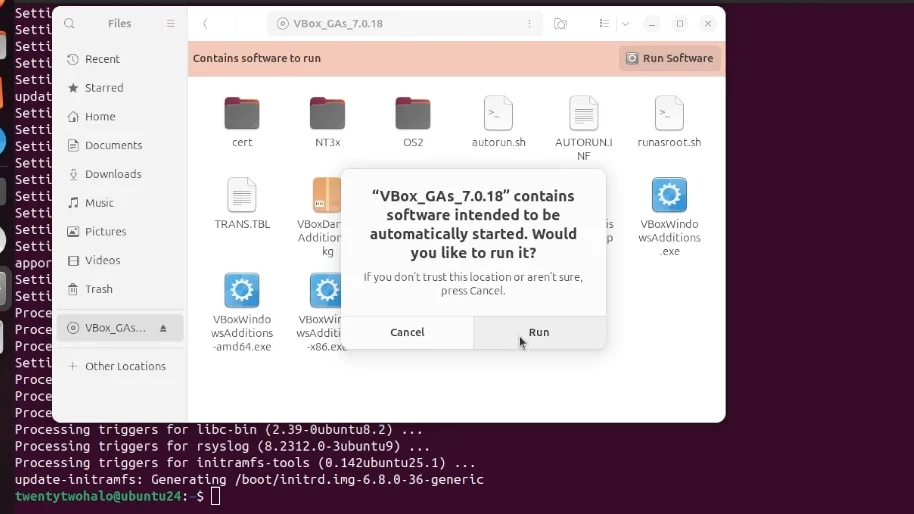
Enter your sudo user’s password and click Authenticate.
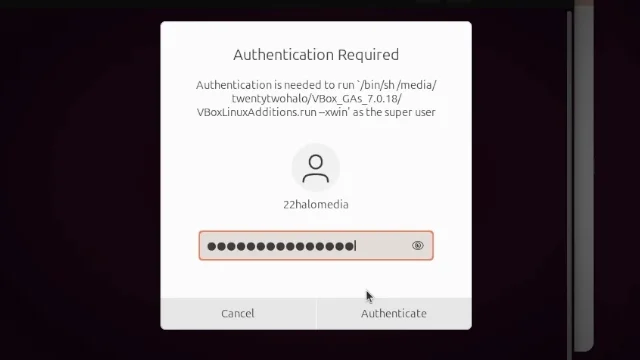
You will get a message informing you bzip2 is not installed.
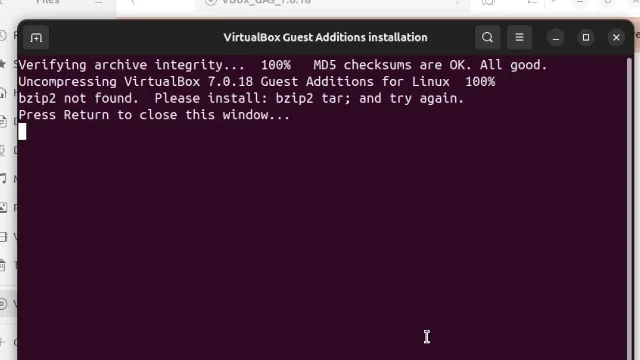
Press Return on your keyboard to close the terminal, then install bzip2 with the following command:
sudo apt install bzip2 -yRepeat previous steps
- Open Files
- Click Devices > Insert Guest Additions CD Image… in the VirtualBox toolbar.
- Click Run when the next window titled ‘”VBox_GAs_7.0.18″ contains software intended to be automatically started. Would you like to run it?’ appears.
- Enter your sudo user’s password and click Authenticate.
Once VirtualBox Guest Additions finished installing, it will output some text, informing you “This system is currently not set up to build kernel modules.”, and “Running kernel modules will not be replaced until the system is restarted.”
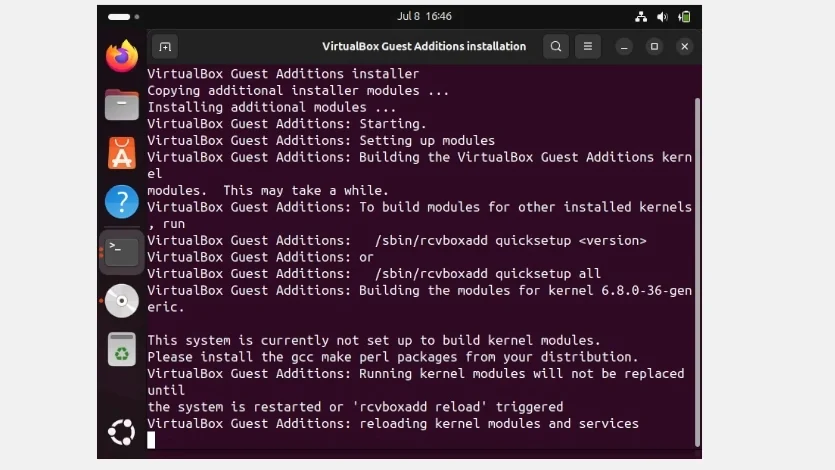
Run the following command to be able to build kernel modules:
sudo apt install build-essential gcc make perl dkmsThen power off your system:
Click File > Close… in the VirtualBox toolbar.
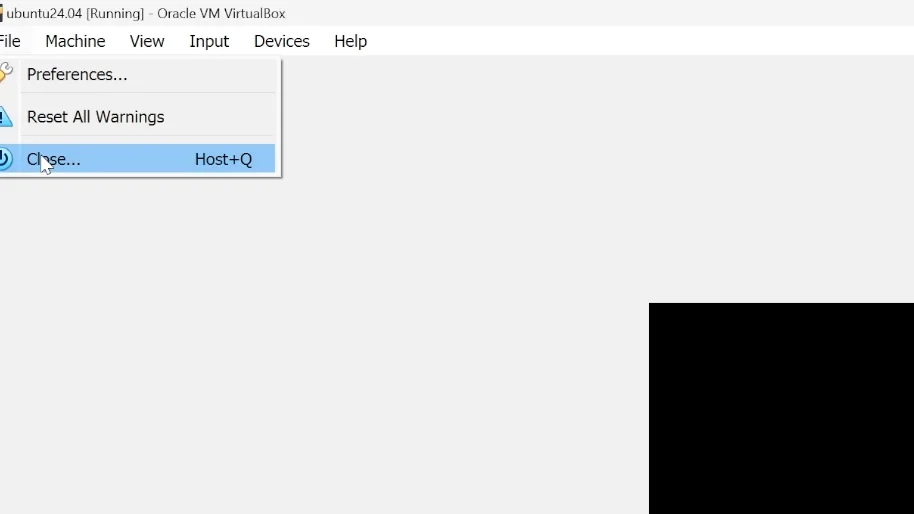
Select Power off the machine, then click OK.
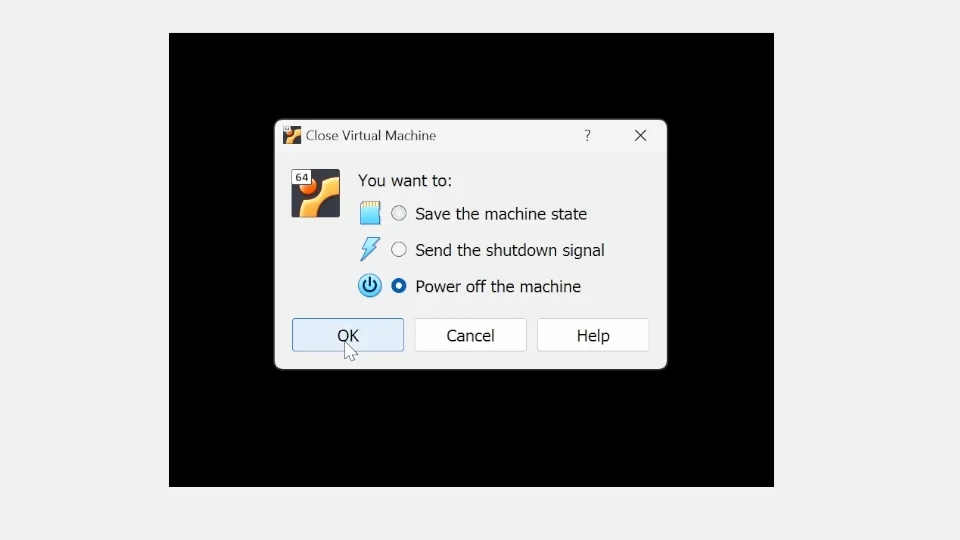
Update Your Ubuntu VM’s Display Settings
Your VM will initially have limited VRAM (video random access memory) assigned, and 3D acceleration will be disabled by default . For the best display experience, allocate as much VRAM as possible. Additionally, enable 3D acceleration if your system supports it.
Click the gear icon in the VirtualBox Manager toolbar to launch the VM Settings.
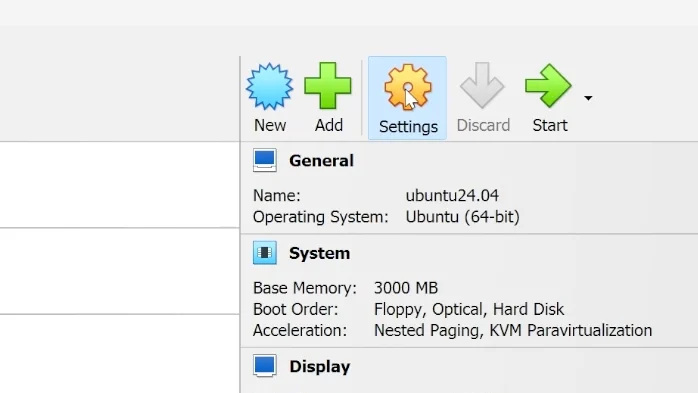
In the left-hand menu, click Display.
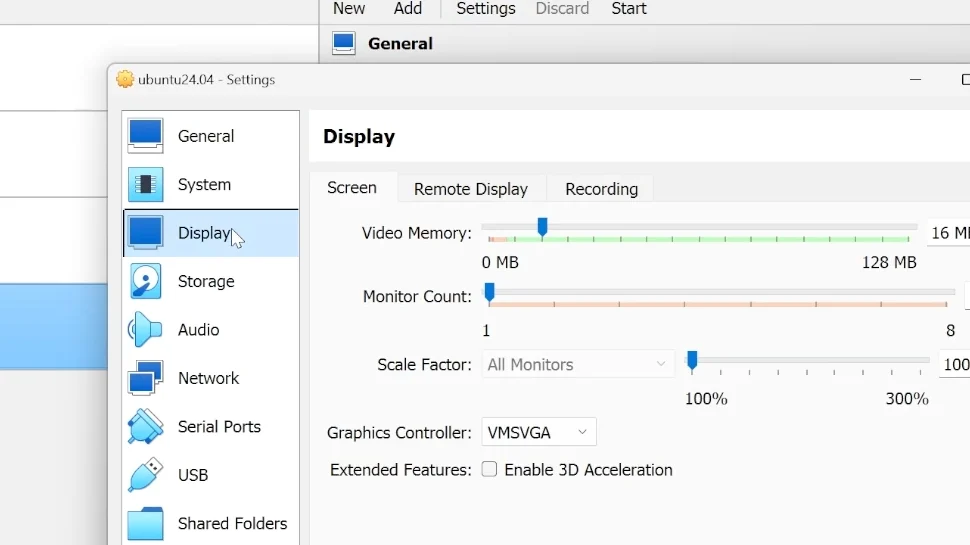
- Increase Video Memory to 128MB or as much as your system can afford.
- Check Enable 3D Acceleration, if your system supports it.
- Click OK.
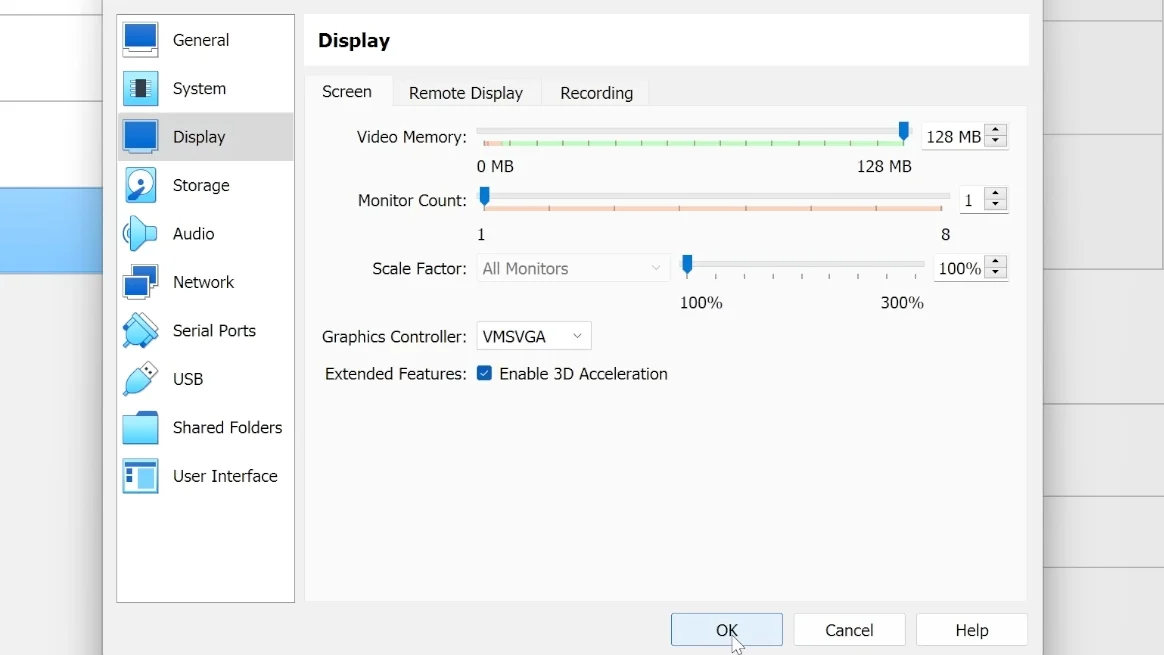
Using VirtualBox Guest Additions
While there are several utilities and additional functionality VirtualBox Guest Additions provides, this guide will focus on auto-resizing your VM for best viewing results.
Start Your Ubuntu VM.
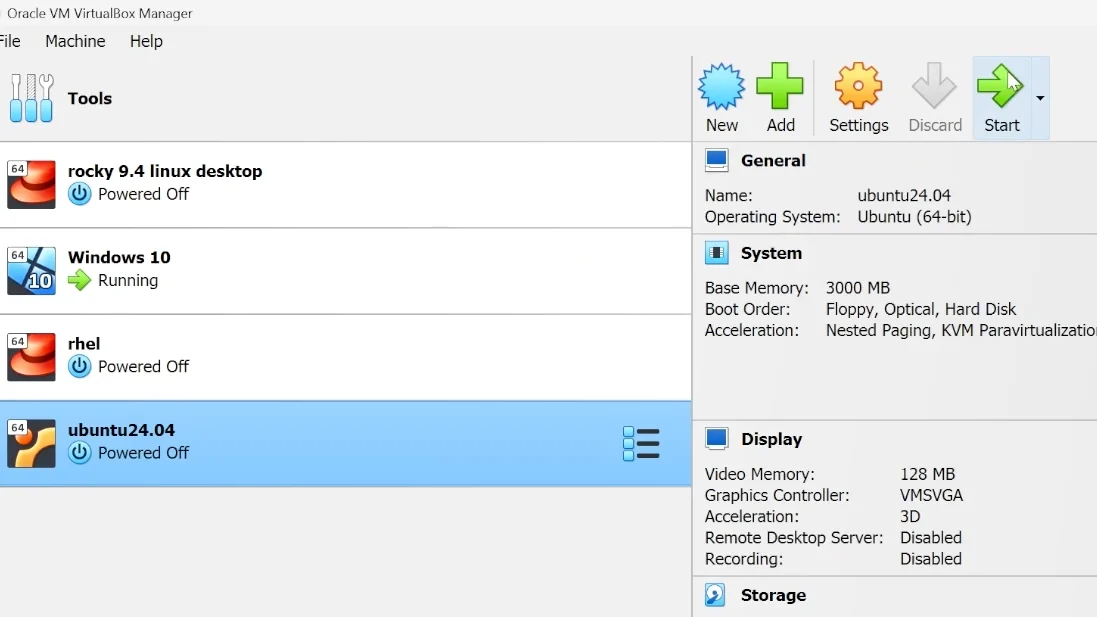
Click View > Auto-resize Guest Display. You may need to repeat this step a few times until the desired effect is achieved. Eventually the VM’s display should stretch across your screen and seamlessly scale clicking and dragging a corner of the window.
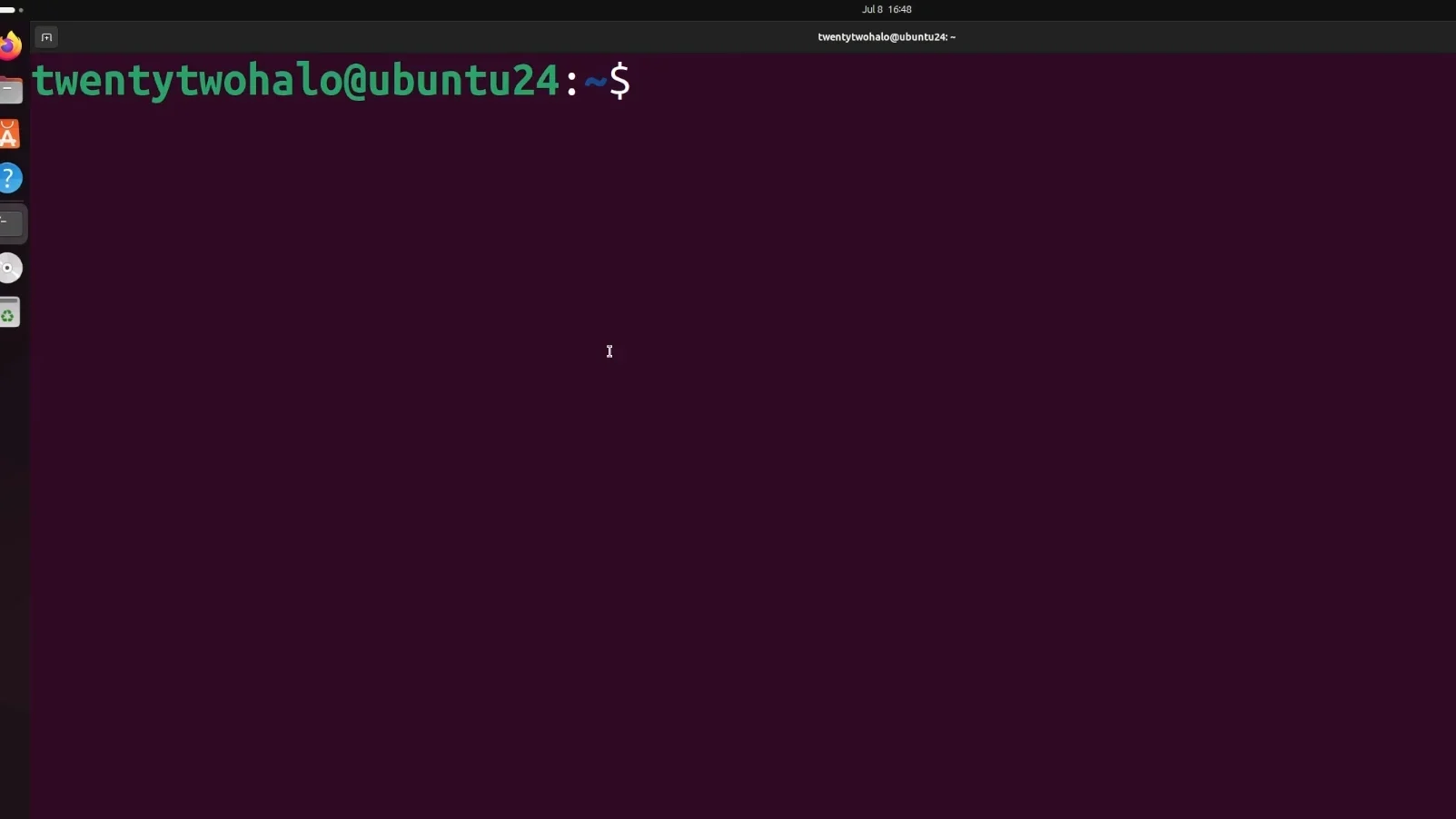
The Ubuntu VirtualBox covering the entire display thanks to VirtualBox Guest Additions Conclusion
As you can see, installing VirtualBox Guest Additions greatly enhances performance and usability. By following the steps outlined in this guide, you’ve created a versatile environment ready for various tasks. Enjoy your enhanced Ubuntu VM experience on VirtualBox!
Thank you for reading this article. If you found it helpful, please consider subscribing to our newsletter.
Additionally, if you’re considering starting an organization or business, creating a website, protecting your WordPress site from malware and cyber attacks, or are in the market for a new gaming laptop, checkout the affiliate links below! 22halomedia uses each of these products and is proudly partnered with these companies.
Articles to Read Next
How to Setup WireGuard VPN on Rocky 9 Linux
Secure Remote Support on LAN with x11vnc over SSH on Rocky Linux
How to Install Virtual Box and Answering “What is a Hypervisor?”
How to Enable Bidirectional Shared Clipboard on VirtualBox VM
How to Create a Linux VM with VirtualBox
Affiliate Links
Form your business with Northwest registered agent
Create a website with name.com
Secure your WordPress website with Wordfence
Affiliate Disclaimer
Please note that my website and content may contain affiliate links. This means that when you click on these links and make a purchase, I may earn a commission. Rest assured, all the products I promote are ones that I believe to be of high quality, and I personally use them as a consumer myself. Your support through these links helps me continue to create valuable content. Thank you for your support!
-

Spinning up an Ubuntu 24.04 LTS Desktop VM in VirtualBox
Subscribe to 22halomedia YouTube Channel
Introduction
Ubuntu 24.04 LTS Desktop is the latest long-term support release from Canonical. In this guide, you will learn how to download the Ubuntu 24.04 LTS Desktop ISO from Canonical’s website and install it on a new VirtualBox VM (virtual machine).
Downloading the ISO
Downloading Ubuntu is as simple as clicking the download button on Canonical’s website. Keep in mind that the file is quite large, at around 6GB, so the download may take some time depending on your internet speed.
How-to download the ISO:
Go to Ubuntu 24.04 LTS Desktop download page.
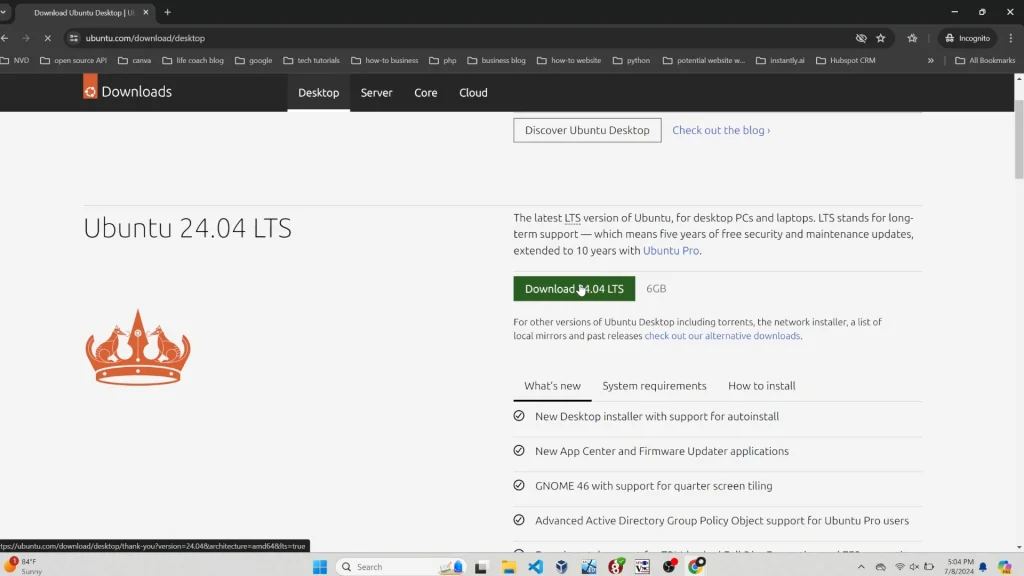
Click the green button that says Download 24.04 LTS.
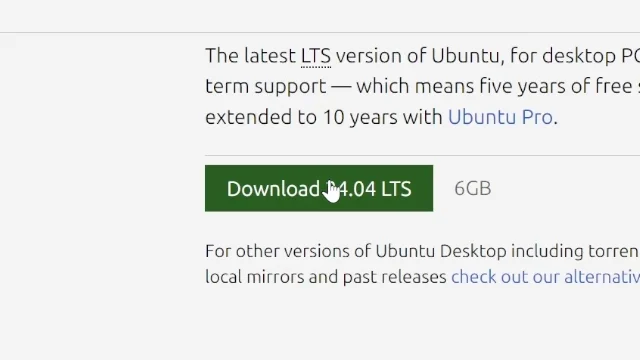
Creating a VirtualBox VM
While creating an Ubuntu VM (Virtual Machine) can be done on any hypervisor, VirtualBox is used in this guide.
How to create a VirtualBox VM:
Click New.
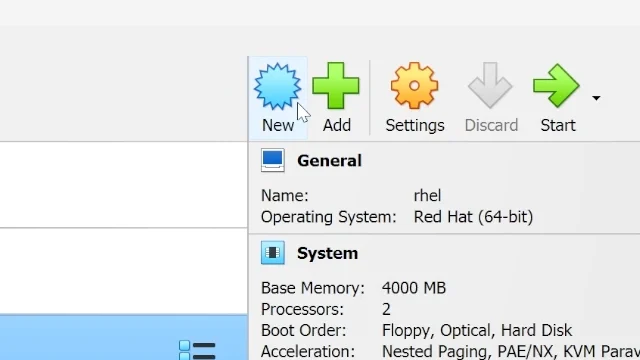
Give your VM a Descriptive Name.
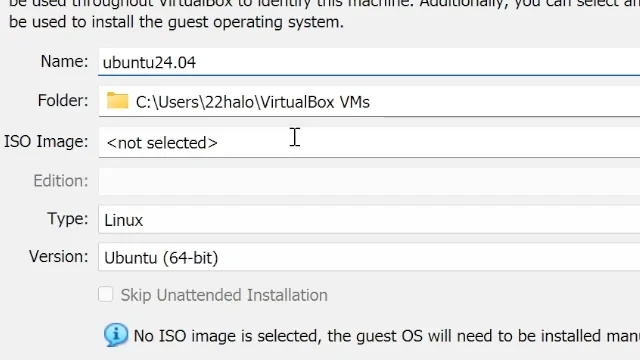
Select the ISO image from the dropdown menu.
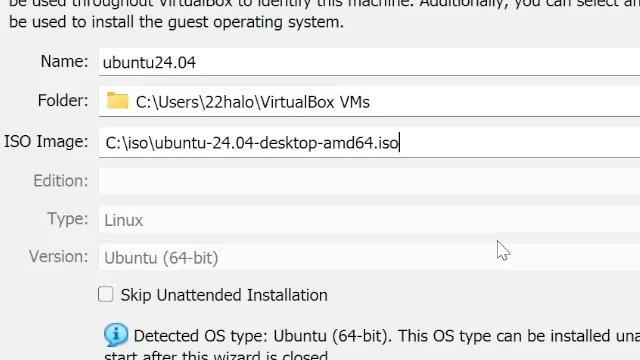
Check Skip Unattended Installation.
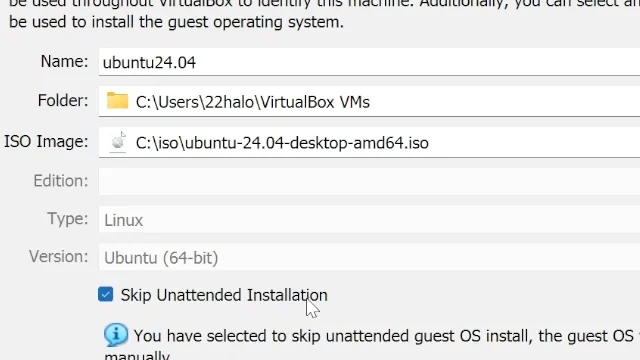
Assign desired amount of Base Memory and Processors to your VM.
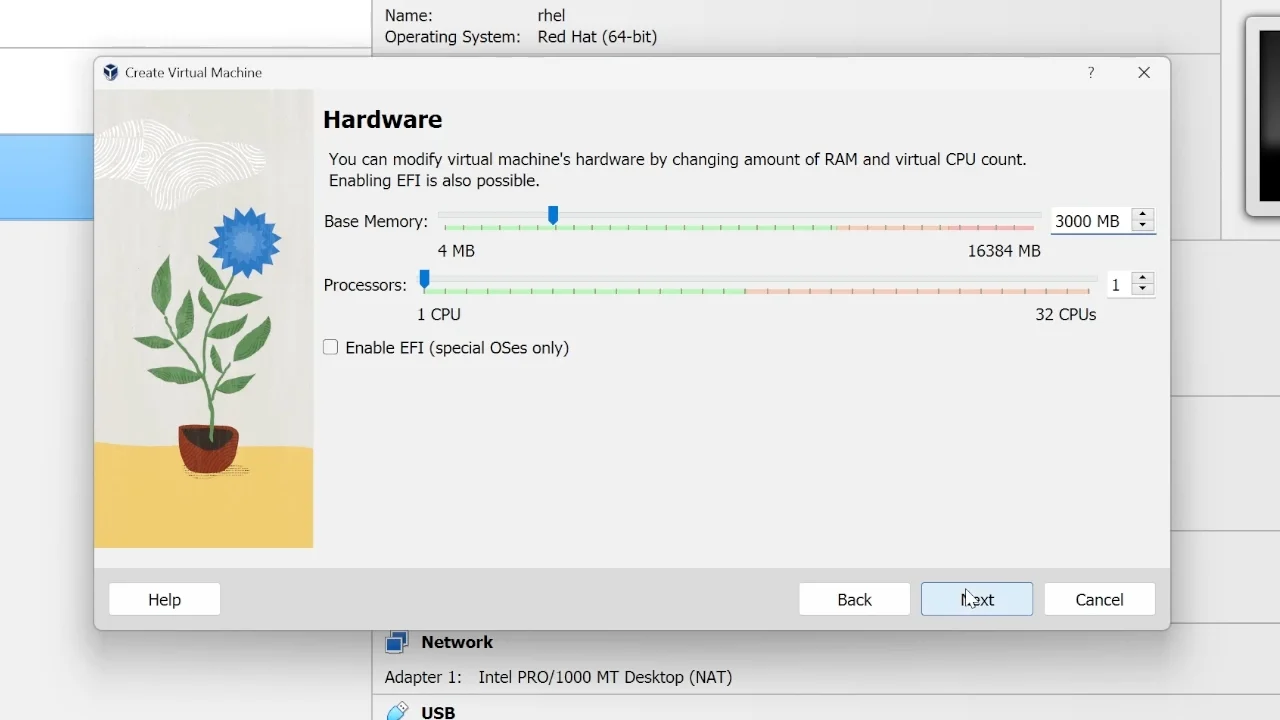
Assign desired amount of disk space towards the VM’s VHD (Virtual Hard Disk). Then click Next.
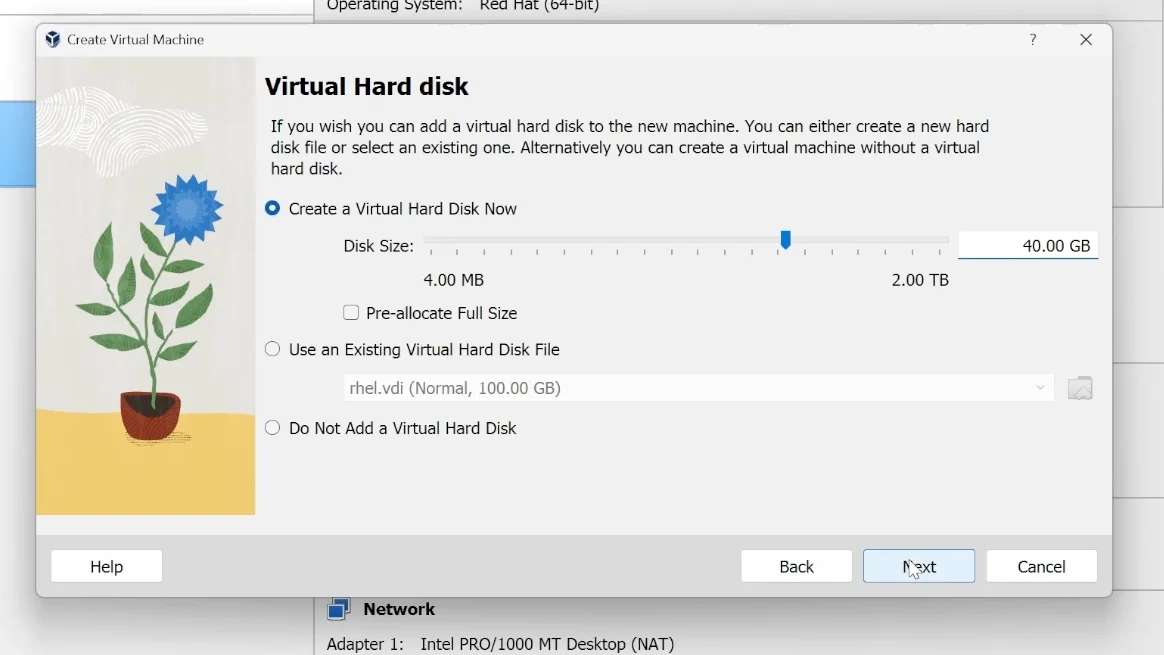
Read the summary and click Finish when done.
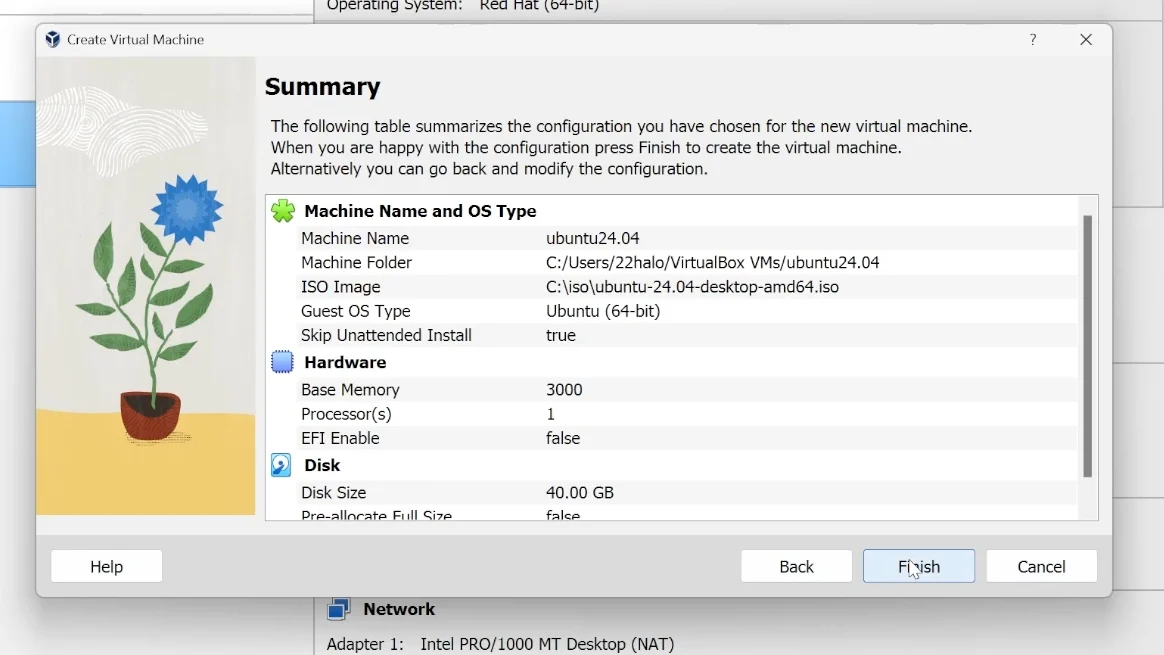
Click Start to boot your VM.
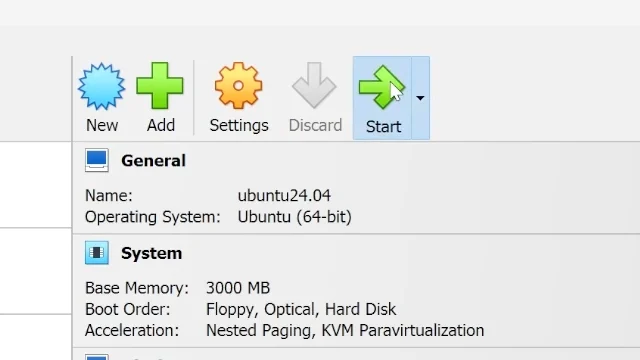
Installing Ubuntu 24.04 LTS Desktop
Congratulations on creating your new VirtualBox VM! Now you need to install Ubuntu 24.04 LTS. While you have the option to try Ubuntu without installing it, for long-term data storage and retrieval, you should install it on the VHD you created earlier.
Press Enter (on your keyboard) when prompted to try or install Ubuntu.
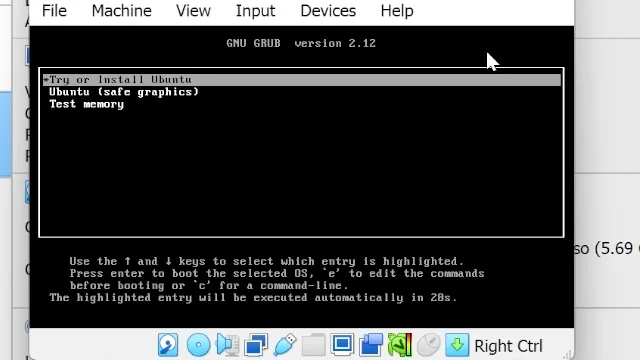
Choose your language, then click Next.
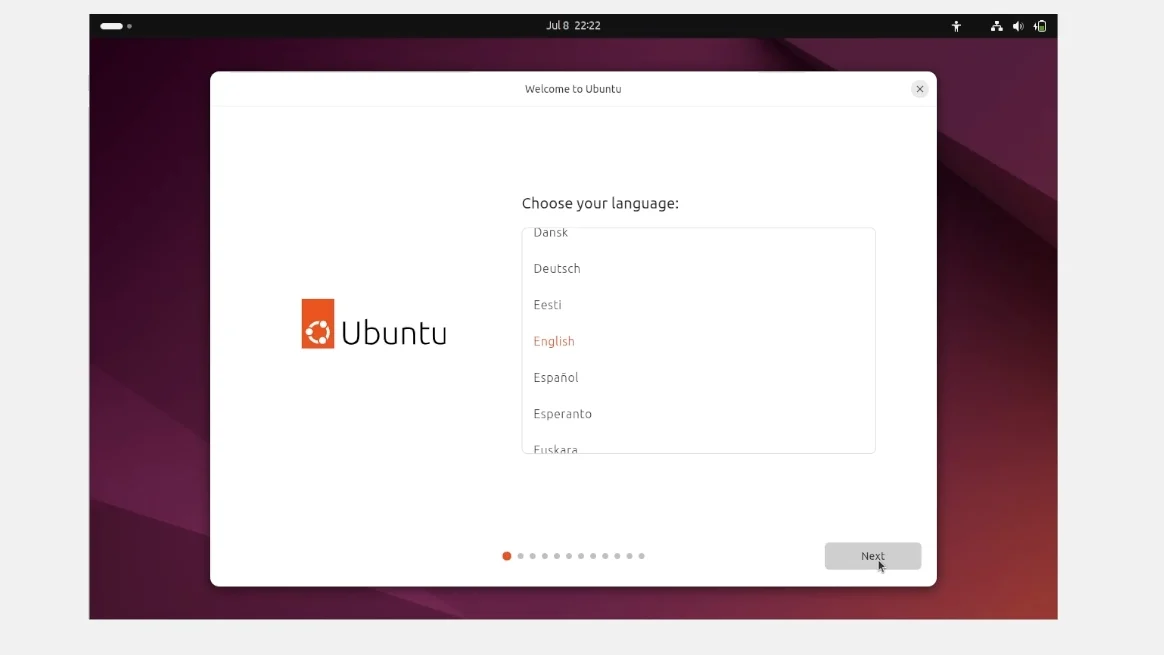
Choose your accessibility options, then click Next.
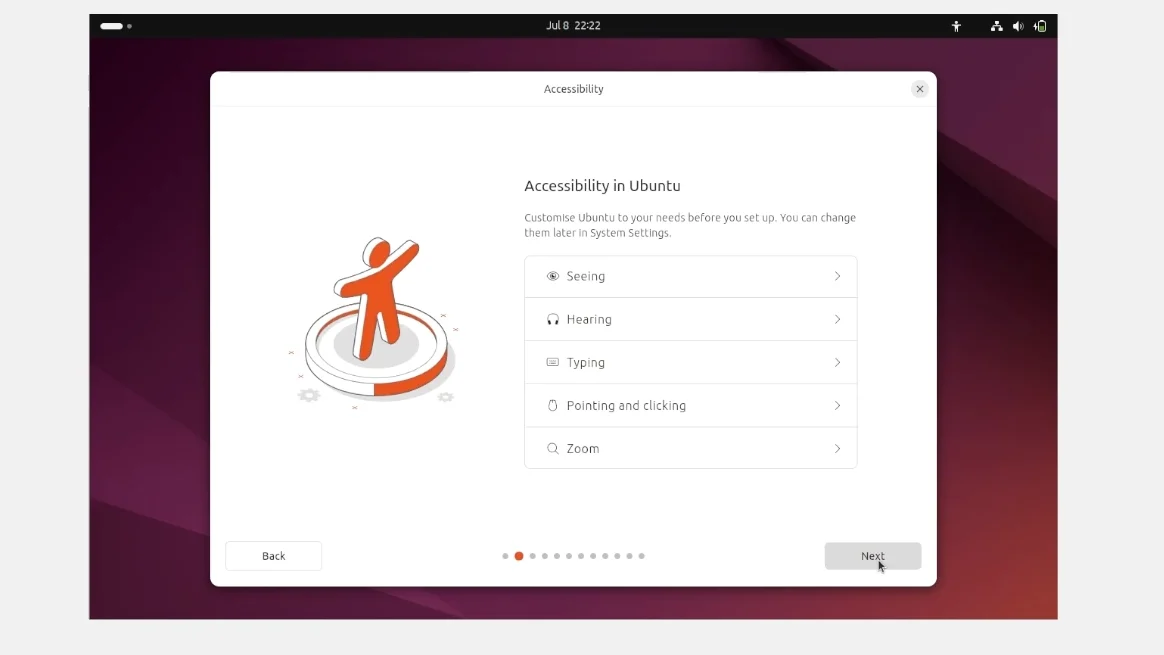
Select your keyboard layout, then click Next.
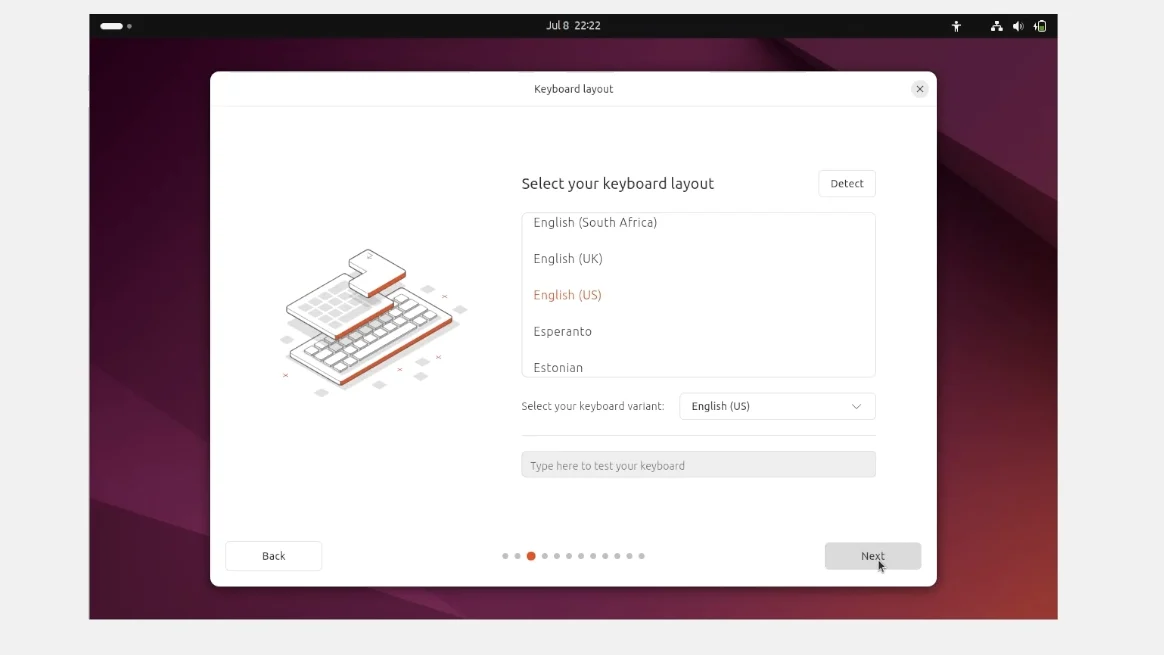
Connect to the internet, then click Next.
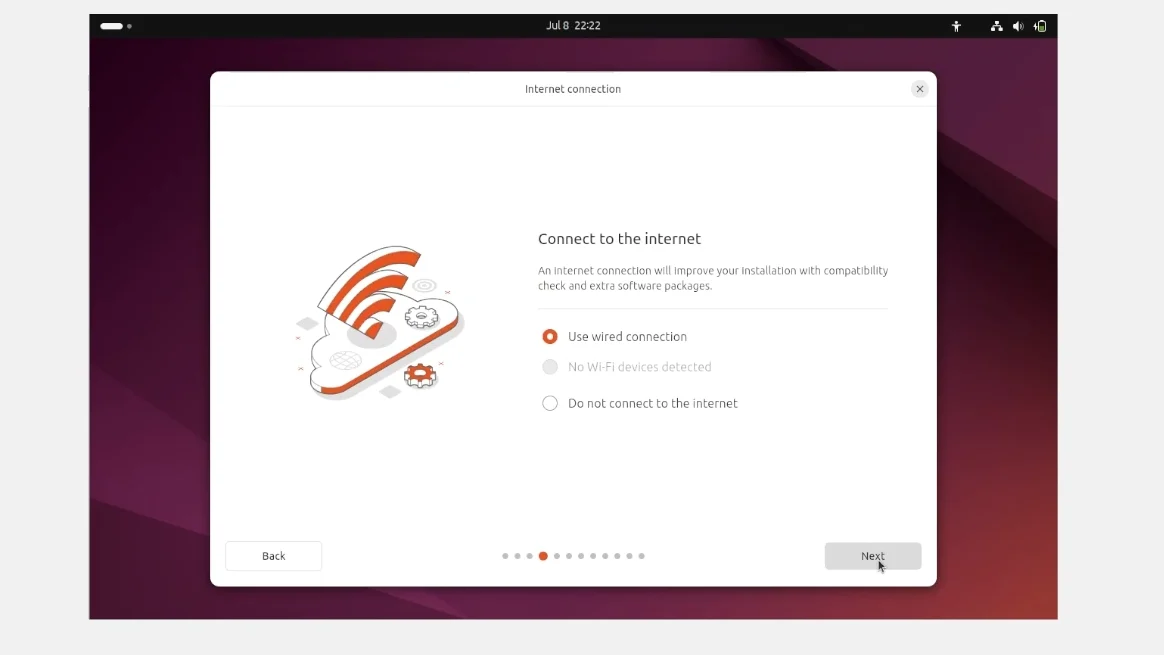
Press Update now to update the installer. Alternatively, press Skip to continue the installation without updating. For the purposes of this guide we will update the installer.
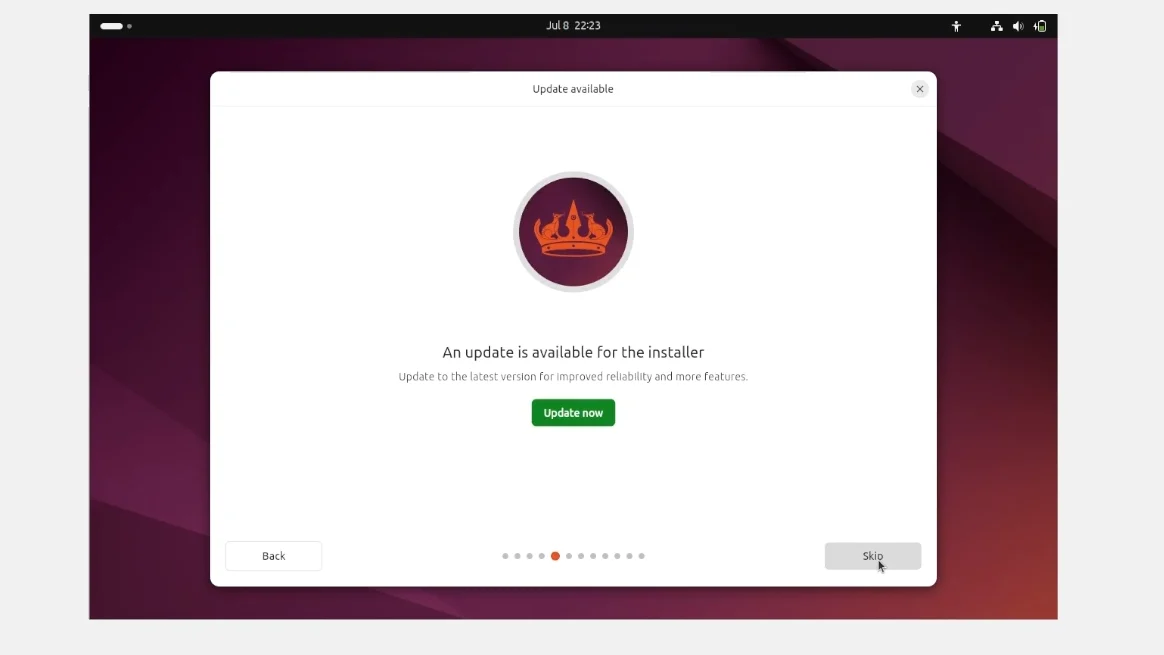
After the installer finishes updating, click Close installer.
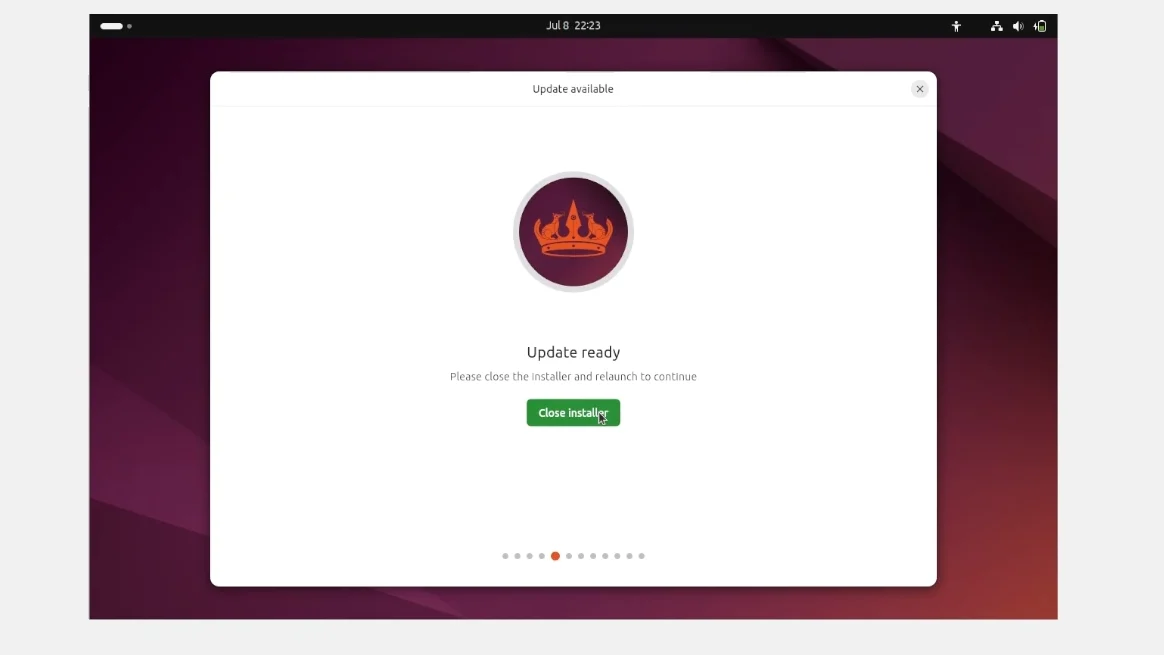
Click Install Ubuntu 24.04 LTS to run the installer again. You will need to repeat selecting the desired options as presented by the installer earlier in this guide.
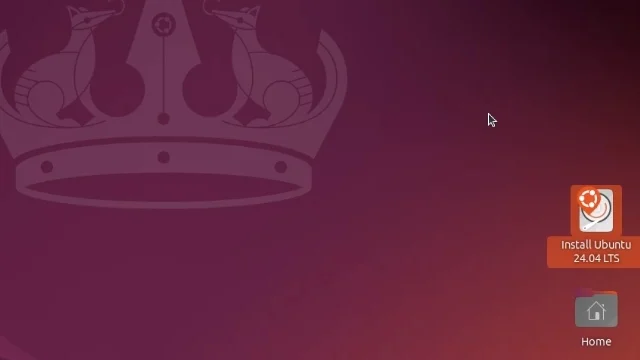
Select how you would like to install Ubuntu. For the purposes of this guide, the default option, Interactive installation, was left selected.
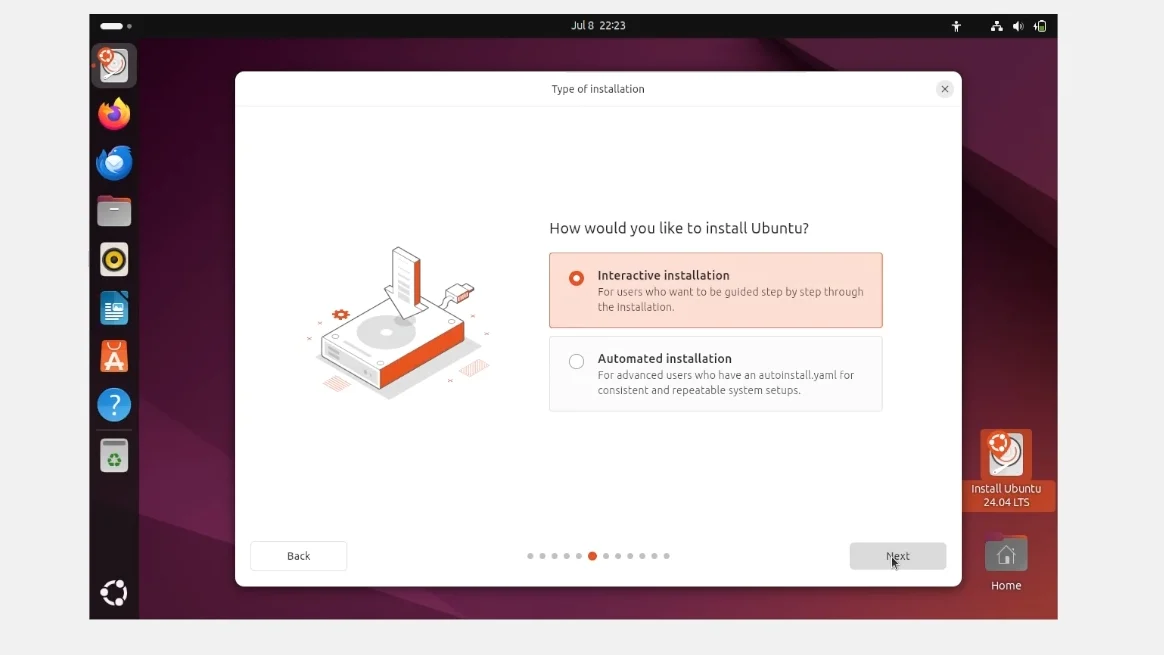
Select the apps you would like to start with. For the purposes of this guide, the default option, Default selection, was left selected. Then click Next.
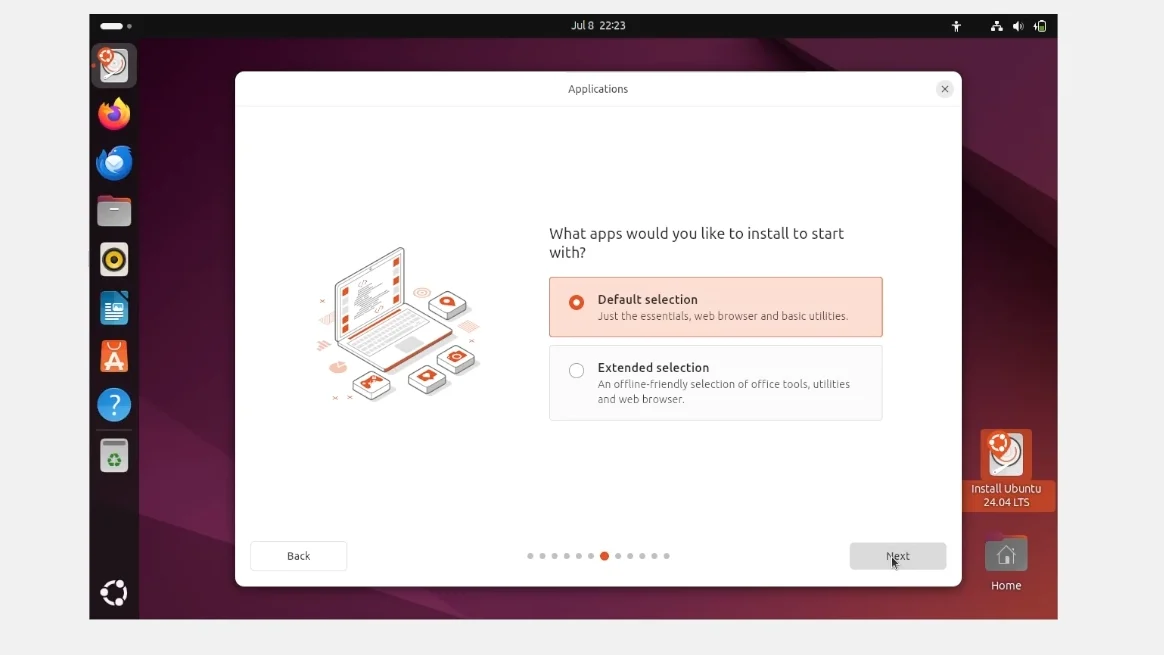
Now you need to choose whether you intend to install proprietary 3rd party software, such as graphics and Wi-Fi drivers, along with media codecs. For the purposes of this guide, both checkboxes under the heading Install recommended proprietary software?, have been checked. Then click Next.
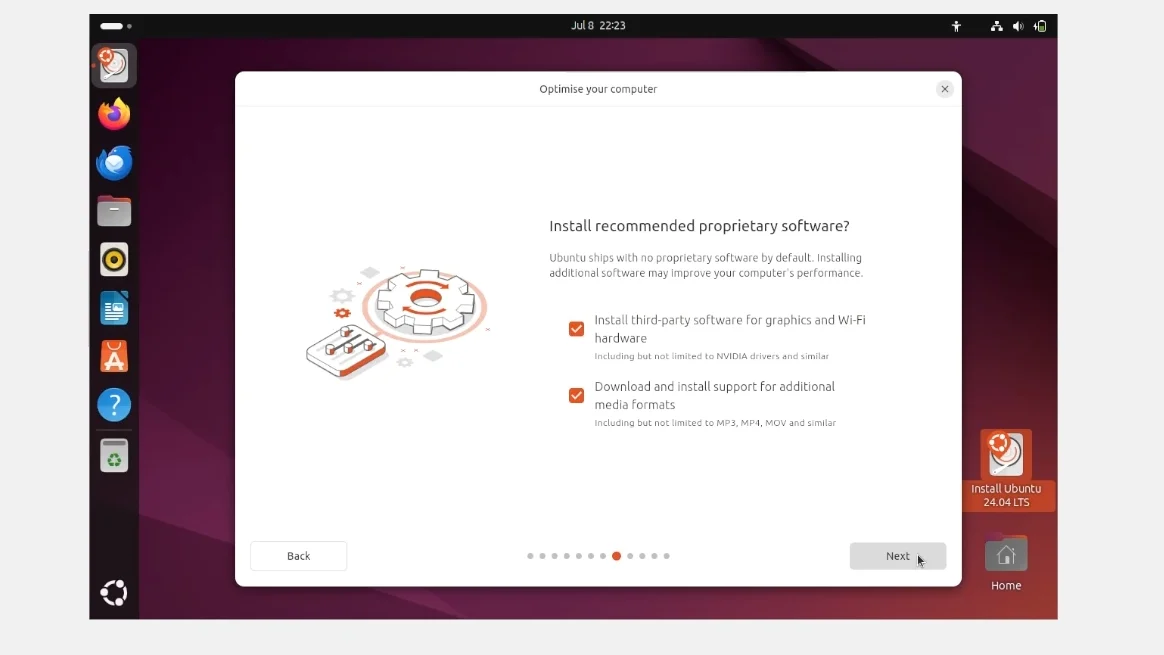
Select how you want to install Ubuntu. For the purposes of this guide, Erase disk and install Ubuntu, has been selected. Then click Next.
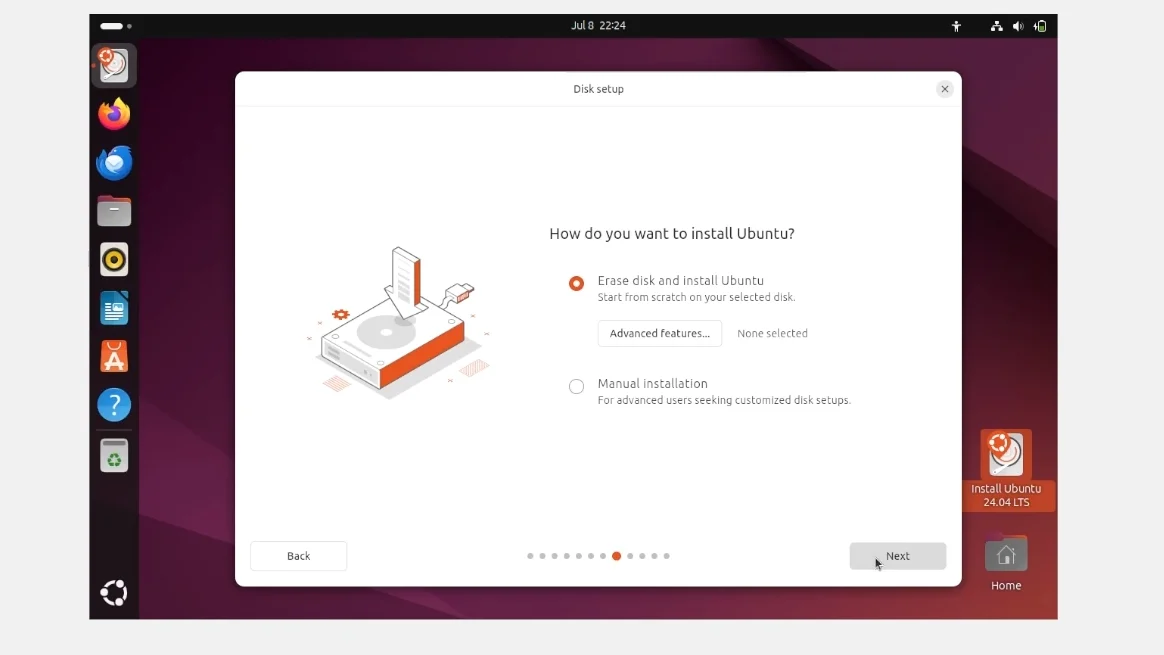
Create your account by providing values for Your name, Your computer name, Your username, and your Password. Leave Require my password to login checked. Then click Next.
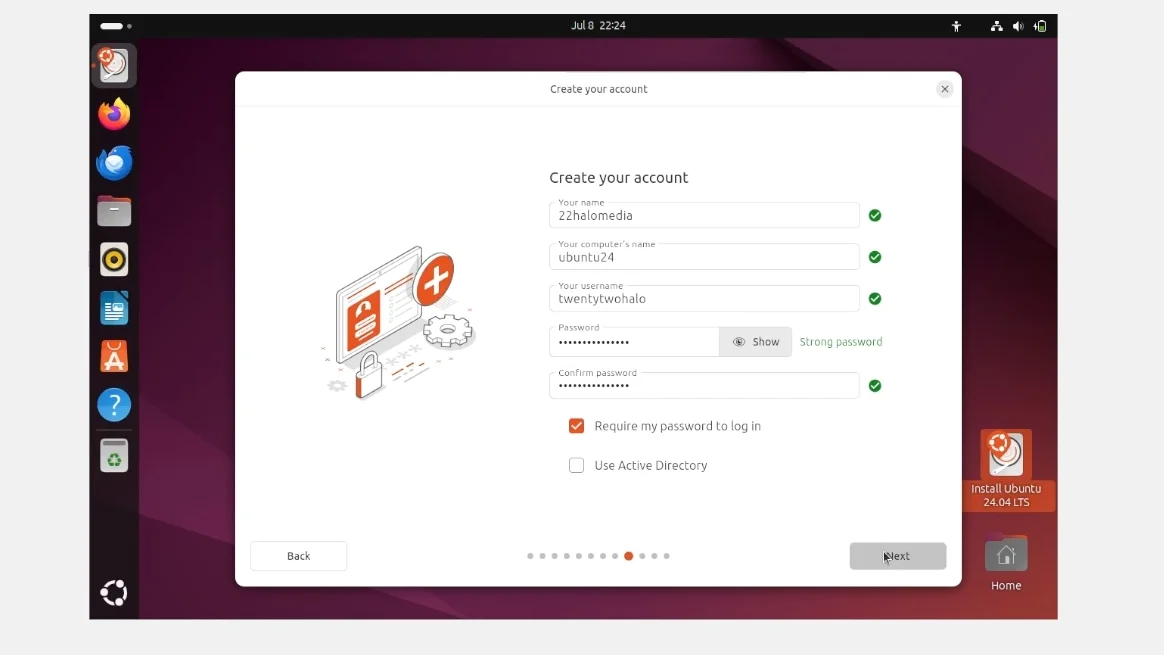
Select your Location and Timezone from their respective dropdown menus. Then click Next.
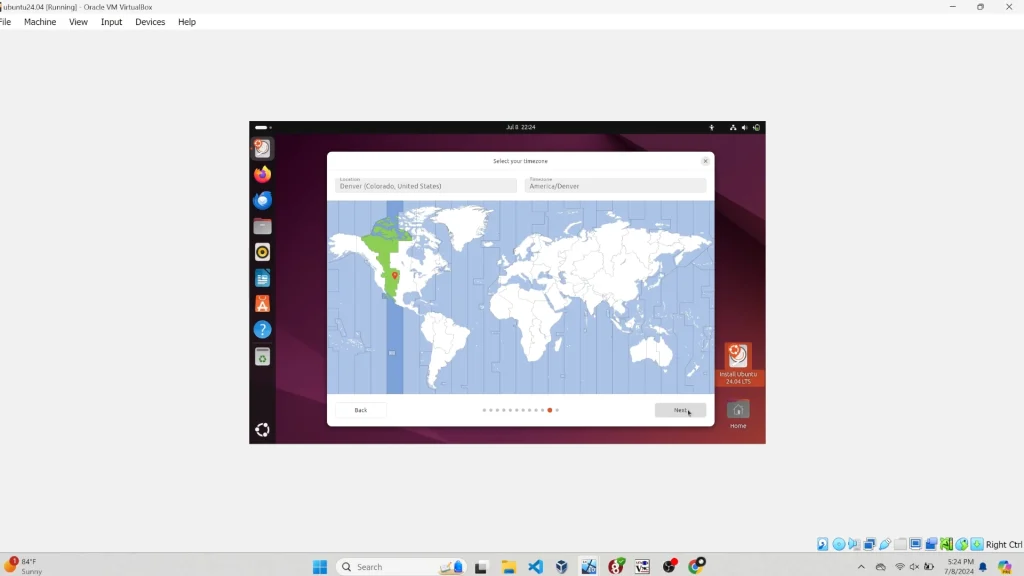
Review your choices.
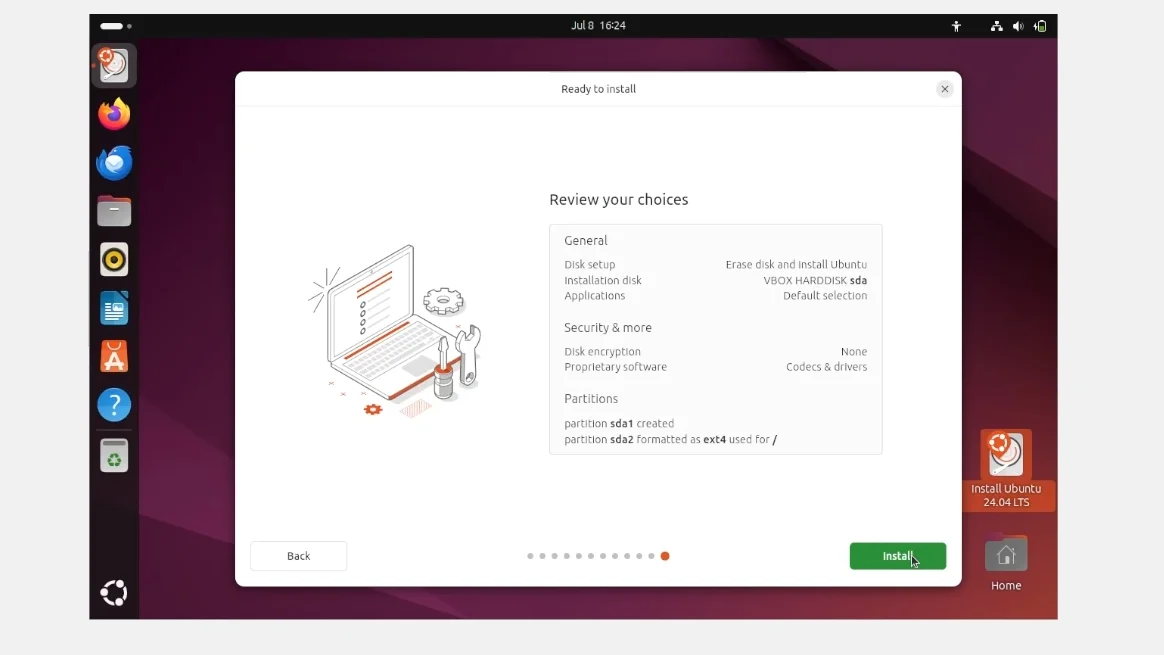
Click the green Install button to start installing Ubuntu 24.04 LTS Desktop.
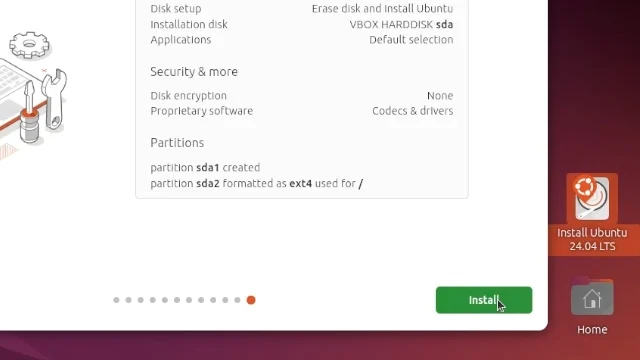
After the installation finishes, restart your PC by clicking the green button labeled Restart now.
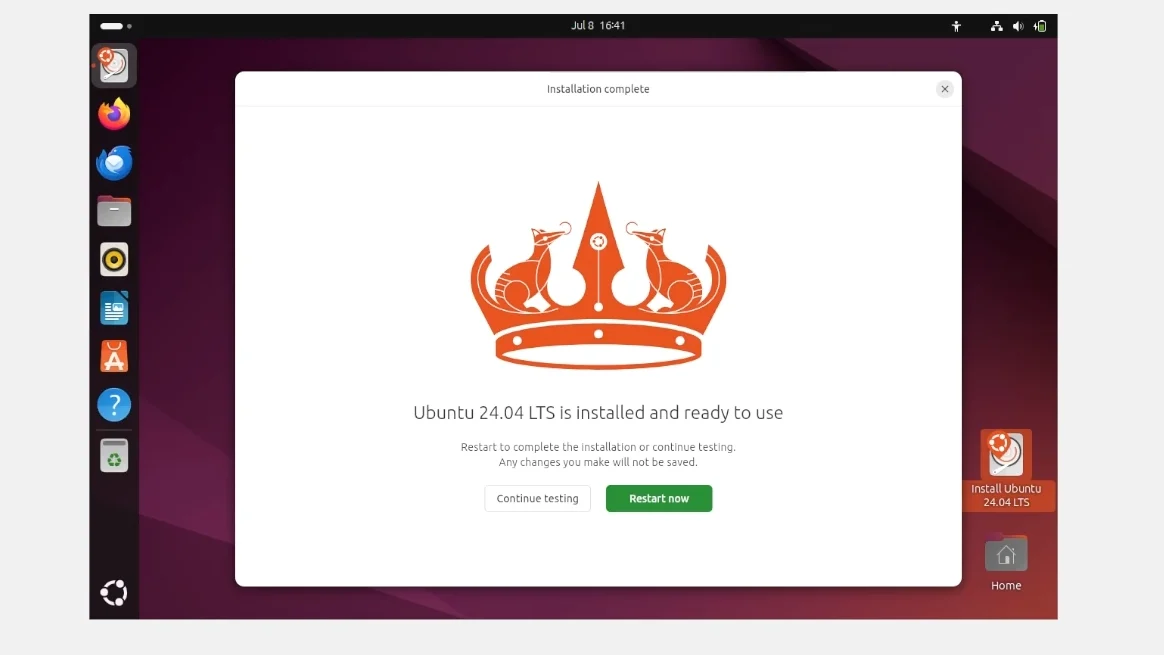
Welcome to Ubuntu 24.04 LTS
When you launch Ubuntu for he first time after installing it, a window with the text “Welcome to Ubuntu 24.04 LTS!” will automatically launch. Read the welcome message before clicking Next.
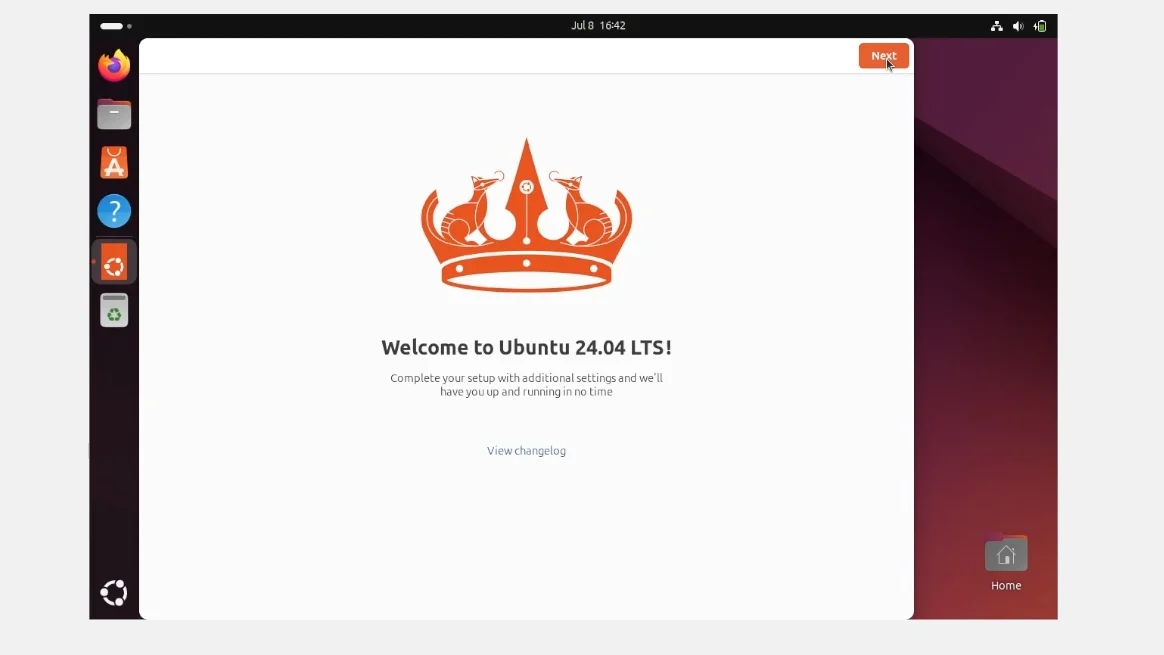
The next window will give you the option to enable Ubuntu Pro. Select Skip for now before clicking Next.
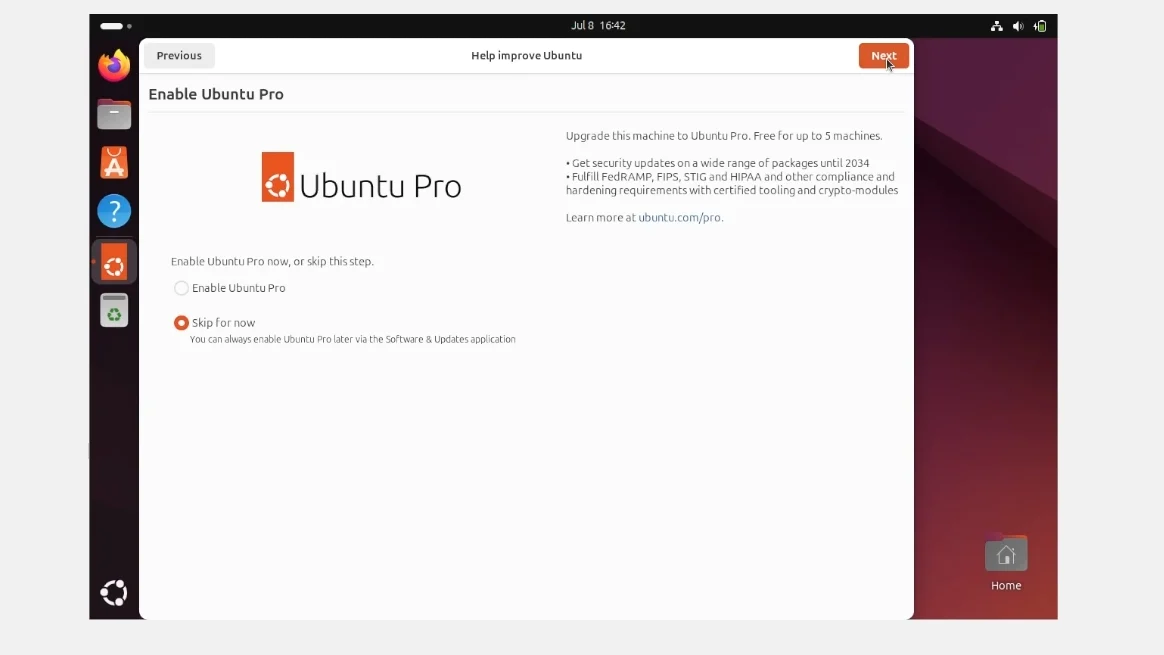
You can help the development of Ubuntu by choosing to send diagnostic data. For the purposes of this article, the option No, don’t share system data was selected. Once done, click Next.
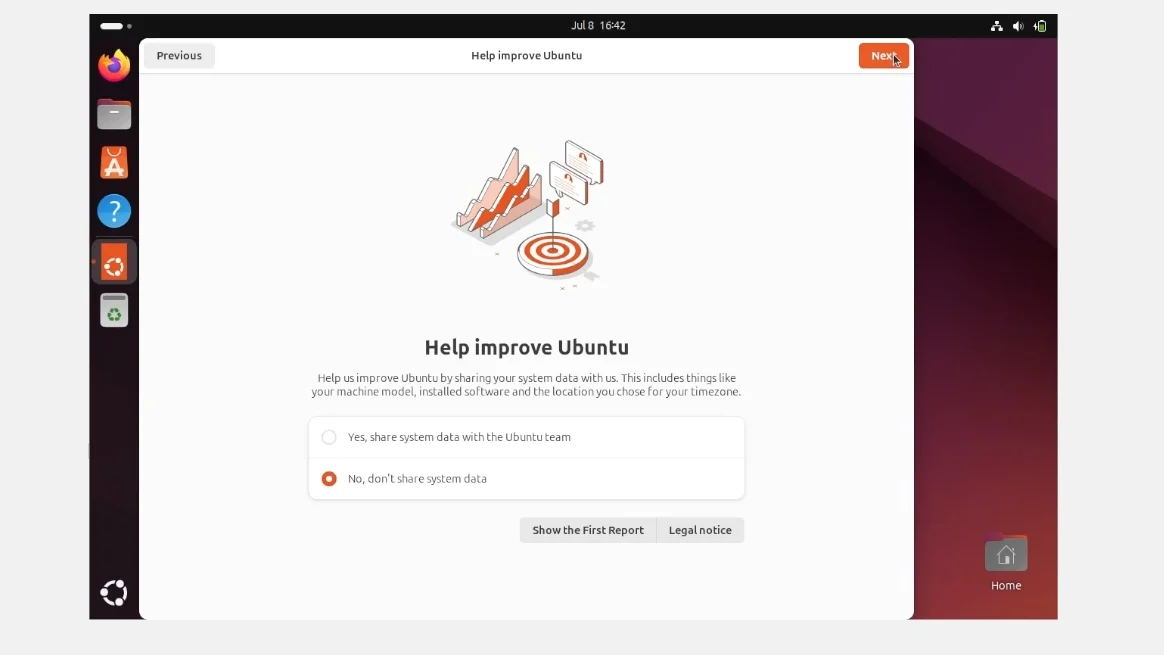
The next window is intended to introduce the software store. Click Next to finish the guided tour.
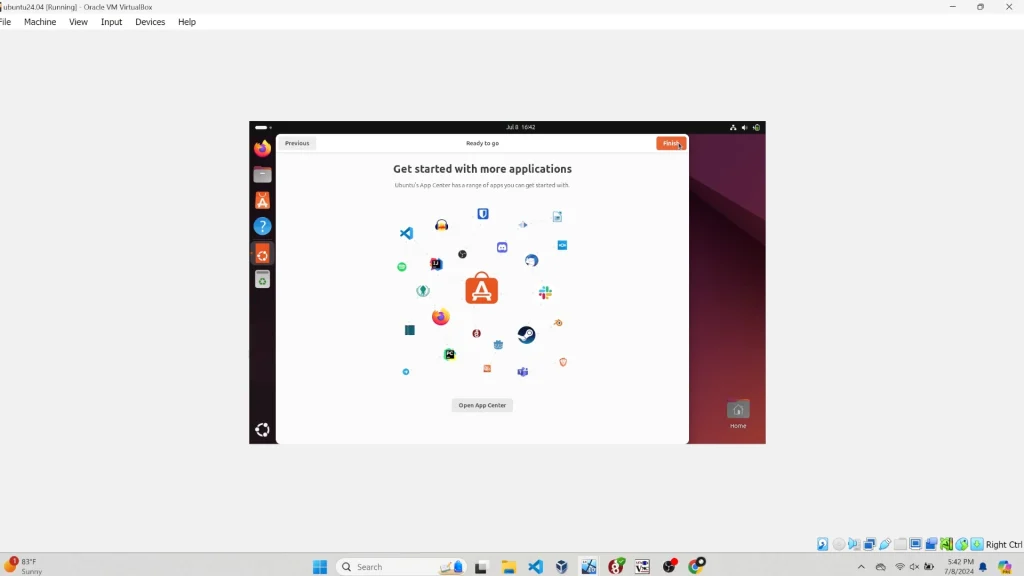
Conclusion
You should now have the necessary knowledge to download an Ubuntu 24.04 LTS Desktop ISO image and create your very own VirtualBox VM complete with a fresh Ubuntu installation.
Thank you for reading this article. If you found it helpful, please consider subscribing to our newsletter.
Additionally, if you’re considering starting an organization or business, creating a website, protecting your WordPress site from malware and cyber attacks, or are in the market for a new gaming laptop, checkout the affiliate links below! 22halomedia uses each of these products and is proudly partnered with these companies.
Articles to Read Next
How to Setup WireGuard VPN on Rocky 9 Linux
Secure Remote Support on LAN with x11vnc over SSH on Rocky Linux
How to Install Virtual Box and Answering “What is a Hypervisor?”
How to Enable Bidirectional Shared Clipboard on VirtualBox VM
How to Create a Linux VM with VirtualBox
Affiliate Links
Form your business with Northwest registered agent
Create a website with name.com
Secure your WordPress website with Wordfence
Affiliate Disclaimer
Please note that my website and content may contain affiliate links. This means that when you click on these links and make a purchase, I may earn a commission. Rest assured, all the products I promote are ones that I believe to be of high quality, and I personally use them as a consumer myself. Your support through these links helps me continue to create valuable content. Thank you for your support!
-
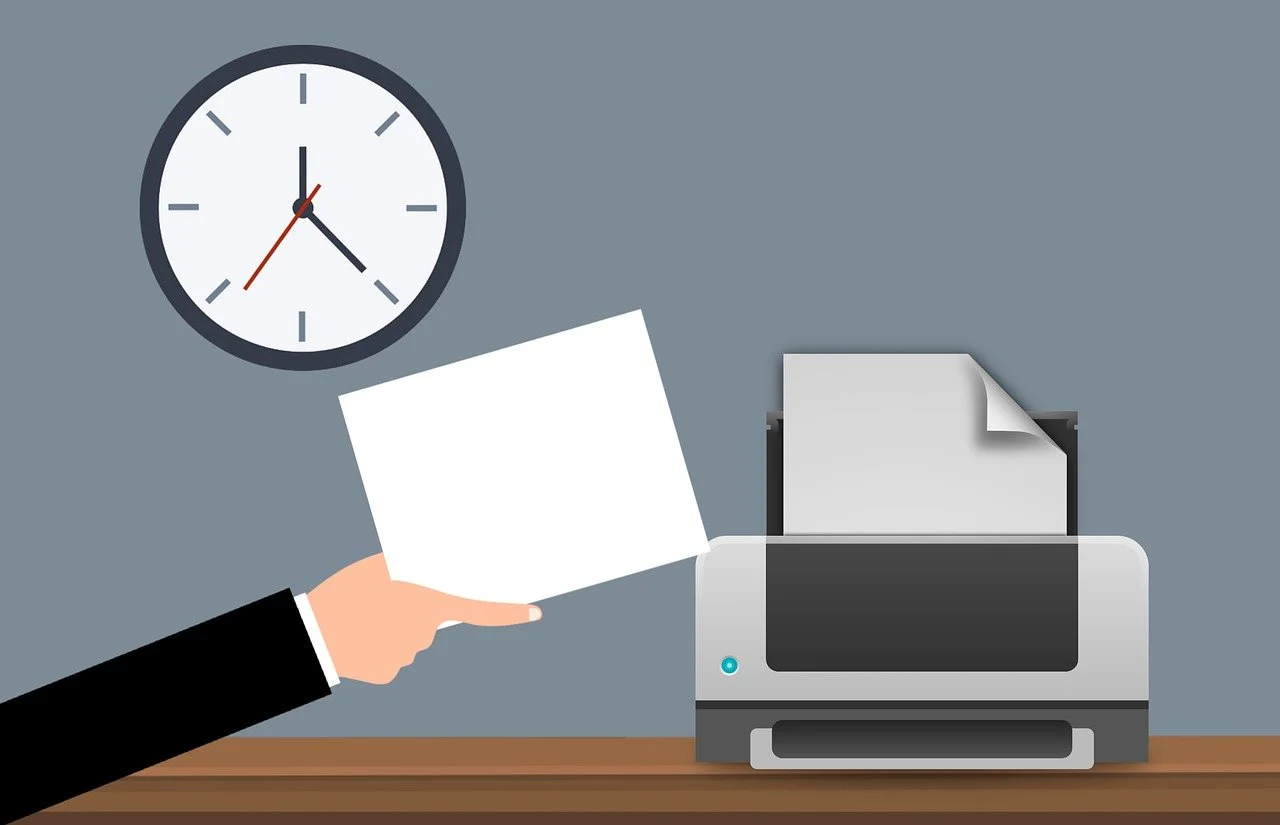
Brother all-in-one Printer Driver Installation and Setup on Rocky 9 Linux Workstation
Subscribe to 22halomedia YouTube Channel
Introduction
Printing and scanning with an all-in-one Brother printer is possible on Linux thanks to 3rd party Brother all-in-one printer and scanner drivers.
Adding a printer in GNOME
- Open Settings
- In the left menu click, Printers
- Notice the banner at the top of the window that says “Unlock to Change Settings”
- Click Unlock and enter sudo credentials.
- Click Add
After clicking Add, Settings will start scanning for printers. If your printer doesn’t show up but you know its IP address on your LAN, enter the IP address manually. Connecting your printer to your home network is beyond the scope of this article.
A Software window launches that attempts to locate and install printer drivers. Generally, this will fail. You will need to go Brother’s website to install the additional drivers.
Downloading and installing the drivers
Brother Driver Installer Script Installation Instructions:
- Download the Brother MFC-J480DW Printer driver bash script
- Open a terminal window.
- Go to the directory you downloaded the file to in the last step. e.g.
cd Downloads - Enter this command to extract the downloaded file:
gunzip linux-brprinter-installer-*.*.*-*.gz - Get superuser authorization with the
sucommand orsudo sucommand. - Run the tool:
bash linux-brprinter-installer-*.*.*-* Brother machine name - The driver installation will start. Follow the installation screen directions
Scanner support¶
Xsane is a scanning utility that provides a graphical user-interface to make scans. It has packages available from the appstream repository requiring no additional configuration.
sudo dnf install sane-backends sane-frontends xsaneThe xsane GUI looks a little intimidating but doing a simple scan is straightforward. When you launch xsane a window with a button exists where you can Acquire a preview. This will take a preview image of a scan. Once read to scan click the button Start in the main menu.
For a more comprehensive xsane guide read this article by the University of Cambridge Faculty of Mathematics
The installation process may take some time. Wait until it is complete. Once finished, you can optionally send a test print.
Conclusion
After installing the necessary Brother drivers and xsane you should now be able to print and scan on your all-in-one Brother printer and scanner.
Articles to Read Next
How to Setup WireGuard VPN on Rocky 9 Linux
Secure Remote Support on LAN with x11vnc over SSH on Rocky Linux
How to Install Virtual Box and Answering “What is a Hypervisor?”
How to Enable Bidirectional Shared Clipboard on VirtualBox VM
How to Create a Linux VM with VirtualBox
Affiliate Links
Form your business with Northwest registered agent
Create a website with namedotcom
Secure your website with Wordfence
Affiliate Disclaimer
Please note that my website and content may contain affiliate links. This means that when you click on these links and make a purchase, I may earn a commission. Rest assured, all the products I promote are ones that I believe to be of high quality, and I personally use them as a consumer myself. Your support through these links helps me continue to create valuable content. Thank you for your support!
